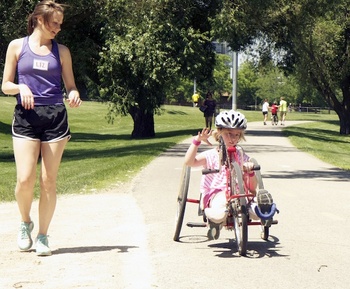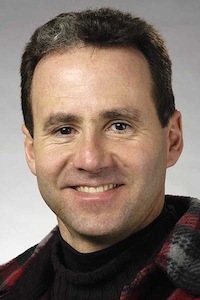Riding High: Course makes biking accessible to children with disabilities
Tim Gattenby is a glass-is-half-full type of guy who brings his own brand of upbeat energy and perspective to his post as coordinator of adaptive fitness and personal training with UW–Madison’s Department of Kinesiology.
“Our motto is, ‘We leave our perceptions of limitations outside these doors,'” Gattenby says while walking around a gym at the UW Natatorium, helping people with a range of disabilities find ways to become more active during an adaptive fitness course. “And we really live by that philosophy.”

Caitlyn Ianne, 10, uses a recumbent hand cycle to ride down the Lakeshore Path during a recent Biking for Everyone course. Class volunteer Liz Johnston looks on.
Photo: Todd Finkelmeyer
It’s an outlook that can be especially beneficial to young people with injuries or disabilities, and their families. And it’s the driving force behind this summer’s Biking for Everyone course, which is a unique eight-week class that’s designed to help kids with disabilities learn how to ride. The program is run through the department’s adaptive physical fitness program, and is made possible by support from Pacific Cycle, which is headquartered in Madison and sells more bicycles than any other company in North America.
“Madison is really renowned for having great, safe places to ride,” says Gattenby. “But I’m the type of person who is always looking for holes and gaps and what’s not being done. So this is an effort to help people who maybe bike differently or who don’t have a chance to learn to bike to join in on the fun.”
Last summer, Gattenby helped launch an adapted fitness pilot project for children with physical disabilities that was designed to teach them about a range of fun fitness activities — including how to ride a bicycle. Unlike many kids, children with physical disabilities often do not get the extra attention and help they need to learn to play sports or become active.

Tim Gattenby
The success of that 2012 pilot program led Gattenby to propose a Biking for Everyone course in 2013, which could provide an opportunity for up to 20 boys and girls during the summer. But during these economically challenging times, the program only became a reality after Pacific Cycle and its global general manager, Jeffrey Rogers, committed to donating:
- Twenty bikes with frames suitable for riders age 6 to 12.
- $5,000 to help fund the program and provide scholarships for students who otherwise wouldn’t be able to afford the summer session.
- Bike helmets, knee and elbow pads.
- And the expertise to choose the proper bike and make the necessary alterations so children with a range of disabilities can ride.
“Pacific Cycle’s involvement is just a wonderful gift, because this program can be life-changing for the whole family,” says Gattenby. “Oftentimes, parents of children who are disabled don’t even realize what is out there and possible.”
Britton Roth, whose 7-year-old son Teddy has cerebral palsy and is taking this summer’s course, says the program has been both inspirational and eye-opening.
“I thought Teddy couldn’t do everything that other kids do, but I think this camp is showing he can really do anything,” says Roth. “Especially as a parent, I need to take that stigma off my child. I naturally want to protect him and want to keep him safe, but that’s not a healthy way of living. This program has been amazing and very empowering. Just because some kids can’t do things the ‘normal way,’ they can still do it another way.”
“I thought Teddy couldn’t do everything that other kids do, but I think this camp is showing he can really do anything.”
Britton Roth
Kim Jensen, whose son Braydin learned to ride a bike during last summer’s course and who is participating again this summer, echoed those thoughts.
“Everything is so positive and uplifting,” Jensen says of the course. “For the kids to realize that even though their bodies don’t function like 95 percent of other kids’ bodies, it doesn’t mean you shouldn’t take care of it. It’s even more important to be healthy and start moving. You have the power to change things in your body if you give it some effort, and sometimes a little effort goes a long way. The children are learning that.”
Thanks to efforts such as this class, the adaptive physical education program has become an important public service and outreach initiative through the Department of Kinesiology. The program works closely with those in the community who have permanent or temporary physical disabilities, and helps them improve their health and independence.
The program also is invaluable to students on the UW–Madison campus.
“We are training students in kinesiology who are going to go on to medical school or be physician assistants and occupational and physical therapists, and this experience is opening their eyes to what is possible for their patients,” says Gattenby.
—Todd Finkelmeyer




